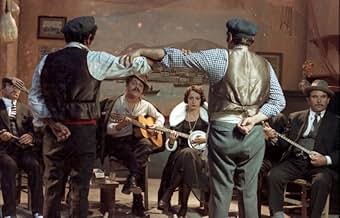PUNTUACIÓN EN IMDb
8,1/10
3,2 mil
TU PUNTUACIÓN
Añade un argumento en tu idiomaThe story of a group of Rembetes, singers and musicians of the Greek equivalent to the blues, in the early decades of the 20th century, seen through the eyes of a young female singer.The story of a group of Rembetes, singers and musicians of the Greek equivalent to the blues, in the early decades of the 20th century, seen through the eyes of a young female singer.The story of a group of Rembetes, singers and musicians of the Greek equivalent to the blues, in the early decades of the 20th century, seen through the eyes of a young female singer.
- Premios
- 6 premios y 2 nominaciones en total
Argumento
¿Sabías que...?
- CuriosidadesThe movie sold 98,492 tickets. It came in 9th out of 33 movies.
- PifiasIn the 2004 director's cut version, at about 52:13, you can see a boom mic in the frame for about seven seconds. Maria is in the back room undressing, while Babis is talking to her from the front room. The mic peeks out from behind the left wall and is visible in the doorway between the two rooms in the center of the screen.
- Versiones alternativasA version released in a retrospective presentation of Greek films organized by the New York Museum of Modern Art, has reduced running time (from 150 min. to 110 min.).
- ConexionesEdited into To didymo tis symforas (1989)
Reseña destacada
In Greece, Rembetiko had always been known as the music of the outcasts. Even the dance that is normally associated with it, (Zeimbetiko), occasionally looks like some kind of ritualistic act of defiance, to those ancient Greek deities, who for their own amusement, are constantly interfering with all our lives, creating Tragedy, Comedy, Pathos and Irony. It had traditionally been associated with Greek refugees from the west coast of Anatolia, who for various reasons, had become dispossessed and were now confined to living their lives under the lower step of the Greek urban social order, engaged in a life style that was considered borderline at best, in more ways then one. The time depicted in this film, covers a period in Athens from about 1922 -1958. This was a time of tremendous transition and instability for the entire Greek nation. The film begins with a montage of what the Greeks have called the Asia Minor Disaster, which was basically a military campaign (waged with rival nation Turkey) gone wrong, and which resulted in a population exchange with their nemesis nation, that increased the population in Greece by approximately 25% almost overnight, in 1923. Most of them ending up in Athens. In was in these overcrowded and economically and spiritually destitute conditions during the1930's, that the Rembetiko genre of music reached its height in popularity. After that, came a World War and Nazi occupation in 1940, and then a tragic Civil War in 1948. On to even more economic and political instability thru-out the 1950's.
In "Rembetiko the movie" veteran Director Costas Ferris, much akin to a masterpainter, uses these historical events, by either showing or suggesting them, to recreate a background of a social order, that always seems to be on the edge of chaos and collapse. Scenery, costumes, period piece trivia etc. are all well executed and are quite successful in recreating a realistic and believable visual context for the period. The viewer will have little difficulty in the area movie pundits love to call "the suspension of disbelief". Winner of the prestigious Silver Bear award in 1984, and without question, one of the most absorbing and provocative films ever to come out of the Hellenic Republic, this is a story that works on many levels, from the superficially romantic and absurd to the exceedingly tragic and disturbingly profound. This is especially true if one is familiar with the history and urban culture of contemporary Greece, during the early and middle years of this century. This 107 minute Hellenic "Once Upon a Time" for adults, is both controversial and unforgettable. The basic storyline may seem somewhat simplistic, but that simplicity is deceptive. There is a great deal going on here that is not always plainly evident. Some of the events portrayed, are based upon the actual life experience of one Marika Ninou, who in reality, had in fact been a well known Rebetisis from that period. A Rebetisis today, is simply a term used for a female singer of Greek Rebetiko music. However during the period in question, being called a Rebetisis had a connotation, that was somewhat more pejorative in nature. The film follows the life experiences of the primary character, also named Marika, from the day of her unwanted birth and exceedingly difficult childhood, to her rise and eventual decline, as a popular Rebetisis, while still only in her mid thirties. She is essentially a very complex character, who is driven by a blind ambition to succeed in her singing career, while simultaneously being sustained through every ordeal in her life, by nothing more, then an enormous strength of character along with an equally strong determination and will to survive. However, in her quest to the top, she becomes increasingly self centered, detached and alienated, as both personal relationships and the overwhelming external events surrounding and affecting her life, spin quickly out of control. Nevertheless finding a deep rooted empathy for her came easy and naturally. In the beginning of the film, Marika is a young women in search of artistic recognition for her music. By the end of the film, ( in a final scene, that can only best be described as quintessentially Greek ), she is, in a very curious and symbolic way, redeemed by it ! Sortiria Leonardou gives a Tour de Force performance as Marika, while the glorious and haunting original Rembetiko compositions of Stavros Xarhakos, permeate the entire production. This is a very powerful film !!
In "Rembetiko the movie" veteran Director Costas Ferris, much akin to a masterpainter, uses these historical events, by either showing or suggesting them, to recreate a background of a social order, that always seems to be on the edge of chaos and collapse. Scenery, costumes, period piece trivia etc. are all well executed and are quite successful in recreating a realistic and believable visual context for the period. The viewer will have little difficulty in the area movie pundits love to call "the suspension of disbelief". Winner of the prestigious Silver Bear award in 1984, and without question, one of the most absorbing and provocative films ever to come out of the Hellenic Republic, this is a story that works on many levels, from the superficially romantic and absurd to the exceedingly tragic and disturbingly profound. This is especially true if one is familiar with the history and urban culture of contemporary Greece, during the early and middle years of this century. This 107 minute Hellenic "Once Upon a Time" for adults, is both controversial and unforgettable. The basic storyline may seem somewhat simplistic, but that simplicity is deceptive. There is a great deal going on here that is not always plainly evident. Some of the events portrayed, are based upon the actual life experience of one Marika Ninou, who in reality, had in fact been a well known Rebetisis from that period. A Rebetisis today, is simply a term used for a female singer of Greek Rebetiko music. However during the period in question, being called a Rebetisis had a connotation, that was somewhat more pejorative in nature. The film follows the life experiences of the primary character, also named Marika, from the day of her unwanted birth and exceedingly difficult childhood, to her rise and eventual decline, as a popular Rebetisis, while still only in her mid thirties. She is essentially a very complex character, who is driven by a blind ambition to succeed in her singing career, while simultaneously being sustained through every ordeal in her life, by nothing more, then an enormous strength of character along with an equally strong determination and will to survive. However, in her quest to the top, she becomes increasingly self centered, detached and alienated, as both personal relationships and the overwhelming external events surrounding and affecting her life, spin quickly out of control. Nevertheless finding a deep rooted empathy for her came easy and naturally. In the beginning of the film, Marika is a young women in search of artistic recognition for her music. By the end of the film, ( in a final scene, that can only best be described as quintessentially Greek ), she is, in a very curious and symbolic way, redeemed by it ! Sortiria Leonardou gives a Tour de Force performance as Marika, while the glorious and haunting original Rembetiko compositions of Stavros Xarhakos, permeate the entire production. This is a very powerful film !!
- ChicagoPT
- 3 oct 1998
- Enlace permanente
Selecciones populares
Inicia sesión para calificar y añadir a tu lista para recibir recomendaciones personalizadas
- How long is Rembetiko?Con tecnología de Alexa
Detalles
Contribuir a esta página
Sugerir un cambio o añadir el contenido que falta

Principal laguna de datos
By what name was Rembetiko (1983) officially released in Canada in English?
Responde


















